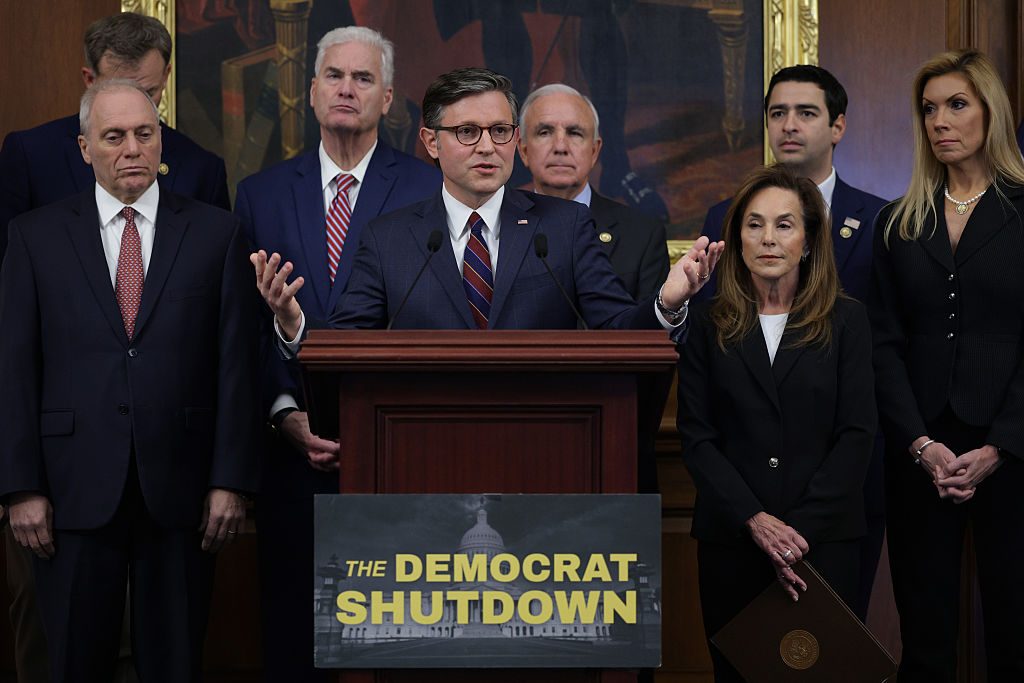The federal government shutdown — the longest in American history to date — may be over soon, thanks to the decision of eight Democrats in the US Senate to join Republicans in a 60-40 vote to end the stalemate. Their defection means that the shutdown will end without the Democrats having achieved their main demand: the extension of enhanced subsidies for the nearly one in seven Americans who receive health insurance through the Affordable Care Act (ACA). Without an extension, it will expire at the end of this year.
Nor did shutting down the government significantly help the perception of the Democratic Party among American voters. A YouGov poll from last Friday showed that 35% of respondents blamed the Republicans for the shutdown, 32% the Democrats, and 28% both parties.
The main effect of the Democrat-driven shutdown has been to spread chaos in government administration and misery among millions of Americans. This includes many of their own constituents, who are low-income people dependent on food stamps and civil servants going without pay. Like the previous shutdown, which stretched from December 2018 to January 2019, this one ended once effects on the federal air traffic control system became severe, with massive domestic airline flight cancellations occurring as air traffic controllers took time off rather than work without pay.
The cause of the earlier shutdown was the refusal of President Trump in his first term to sign any spending bill without funding for his southwestern border wall, which the Democrat-controlled House refused to supply. In that case, Trump capitulated and signed a temporary spending bill, while Congress later passed limited funding for border fencing.
Both shutdowns, then, ended with the failure of those supporting them to obtain their policy goals. Nevertheless, as a weapon of political warfare, both Democrats and Republicans have been willing to cause ever longer paralysis of the federal government.
This shutdown has lasted 41 days to date. The 2018-19 shutdown lasted 35 days. Before that, the longest shutdown was in 1995-96, when President Bill Clinton vetoed a budget bill by the Republican Congress. That shutdown lasted 22 days. The fourth-longest was in 2013, when Tea Party Republicans pressured the GOP into a shutdown with the goal of defunding the recently-passed Affordable Care Act and slashing the federal budget. That effort also failed when the Republican leadership capitulated.
Given the repeated failure of supporters of shutdowns on Left and Right to succeed in paralysing the government to promote their goals, and the frequent reputational damage to one or both parties, why is this legislative tactic becoming more frequent and more destructive? Arguably, it is because there is increasing pressure on party leaders from their most radical supporters.
In an age of weak parties and incendiary online media, zealous factions such as the Tea Party Right in the Obama years, as well as the MAGA Right and most progressive Democrats today, prefer ruination to rule. For the extreme Right and the extreme Left, compromise — the essence of democratic government — is weakness and cowardice. When their party loses an election, these politics-obsessed, internet-addicted political amateurs who have disproportionate influence on party primaries and donors, rather than focusing on winning the next one, try to paralyse or dismantle the parts of government the other team controls.
A perfect illustration of this destructive dynamic was that the eight Democratic senators who courageously voted to end the present shutdown were denounced by the rest of their party. They have been vilified as weaklings and traitors by most Democrats, including California Governor and presumptive 2028 presidential candidate Gavin Newsom, who called the shutdown-ending deal “pathetic”.
Shutdown supporters in both parties, such as Newsom, have been trying to curry favour with extremist primary voters and activists, not seeking the approval of American voters in general. According to a Gallup poll from the first two weeks of October, 79% of Americans disapprove of “the way Congress is handling its job” compared to only 15% who approve, with 6% having no opinion. Approval of Congress, though low, was nearly twice as high (26%) in September before the shutdown began.
Rule-or-ruin extremism may sell with the far-Left and the far-Right, but most Americans wisely reject it.










Join the discussion
Join like minded readers that support our journalism by becoming a paid subscriber
To join the discussion in the comments, become a paid subscriber.
Join like minded readers that support our journalism, read unlimited articles and enjoy other subscriber-only benefits.
Subscribe